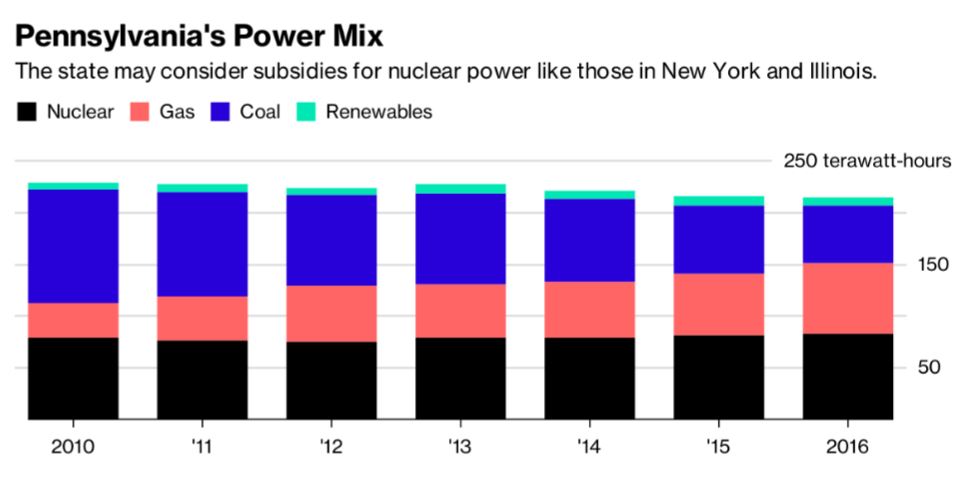By Richard Stubbe
- Exelon says Three Mile Island will close in late 2019
- New York, Illinois have passed Zero Emission Credits
Even as the market is discouraging new nuclear plants in the U.S., states are paying the existing ones not to close.
Exelon Corp., which won state subsidies for its money-losing nukes in New York and Illinois, has turned its attention to Pennsylvania, where it announced it will close the Three Mile Island plant near Harrisburg in 2019. Chris Gadomski, who analyzes the nuclear industry for Bloomberg New Energy Finance, anticipates in a BNEF report the state will keep the 819-megawatt plant running.
Note: Oil and other sources add less than 1 terawatt-hour. Source: Bloomberg New Energy Finance
“What I see is a growing interest in keeping these reactors operating because they do things that are important,” Gadomski said in a phone interview. “They employ many people, they pay big taxes, and they generate a lot of carbon-free electricity.”
Losing Millions
Exelon announced the plan to close Three Mile Island in June. The plant, which has lost more than $1 million a week over the past five years, has a federal license to operate until 2034. BNEF estimates the plant can operate profitably at $34.60 a megawatt-hour, about 30 percent above the current market price of $26.90.
Faced with having some of their nuclear plants close, New York and Illinois passed Zero Emission Credits to keep them operating. The ZECs pay nuclear operators for generating emission-free power.
Natural Gas
Pennsylvania, home of the natural gas-rich Marcellus shale formation, doesn’t need the output from Three Mile Island for itself. Demand has been flat for years. The state added 1.8 gigawatts of natural gas-fired generation in 2016 and has more than 11 gigawatts under development. Gas has been taking market share from coal.
Still, ZECs are a likely option when Pennsylvania legislators reconvene next month because almost all of Pennsylvania’s carbon-free generation comes from nuclear, Gadomski said. And it will set a precedent for other states, as the ZECs have thus far survived court challenges from competing power producers like Dynegy Corp. and NRG Energy Inc.
“Pennsylvania is a key state,” he said. “If the legislature goes ahead and authorizes legislation that supports the nuclear power plants, it’s just a matter of time before policy makers in New Jersey, Connecticut, and Ohio follow suit.”
Last month, two South Carolina utilities abandoned construction on an overdue, over-budget project near Columbia, leaving two reactors in Georgia as the only ones still being built in the U.S. Five nuclear plants were retired in the country from 2012 to 2016, leaving 99 reactors operating at 61 plants, according to the U.S. Energy Information Administration.
